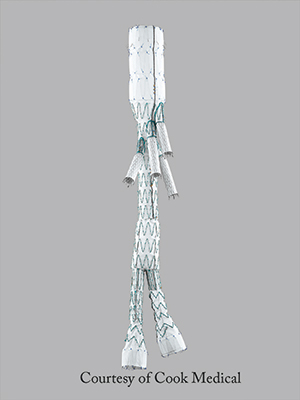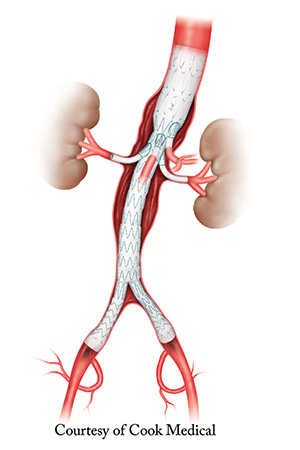New Custom-Designed Treatment Option for High-Risk Aortic Aneurysms
Mar 31, 2014
NEW YORK
Vascular surgeons at NewYork-Presbyterian/Weill Cornell Medical Center are investigating the use of custom-designed stent grafts for the treatment of thoracoabdominal aortic aneurysms — a potentially deadly enlargement of the main artery carrying blood from the heart to the body and vital organs — for patients deemed high risk for open surgery. The FDA-approved clinical trial aims to address the unmet need for minimally invasive stent graft devices that can provide a safe and effective treatment for patients with aneurysms located in the aorta in both the chest and abdomen. No stent graft treatment is currently commercially available for these patients.
Treatment of thoracoabdominal aortic aneurysms, complex aneurysms that span both the thoracic aorta in the chest and the abdominal aorta, usually consists of open surgery, which carries up to a 20 percent risk of death because of the complexity of the operation. In addition, many patients undergoing this surgery are elderly and may have other medical conditions, precluding the option of surgery or making it highly risky.
The study is led by Dr. Darren Schneider, chief of vascular and endovascular surgery at NewYork-Presbyterian/Weill Cornell Medical Center and associate professor of surgery at Weill Cornell Medical College. The stent grafts are custom designed for each patient's anatomy by the NewYork-Presbyterian/Weill Cornell study team and are manufactured by Cook Medical. The stent grafts are assembled during the operation with up to five custom-placed branches for the various critical vessels that supply blood to the kidneys, liver, intestines and other organs, allowing for a precise fit.

"What's unique about this trial is that it's with a special minimally invasive stent graft device that will now allow us to fix thoracoabdominal aortic aneurysms without the large incisions used in the traditional open surgery," said Dr. Schneider. "It's our hope that with this new technology, we can fix these complex aneurysms and spare patients from the risk of major complications and death associated with open surgery."
An aneurysm is a common condition in which a portion of the aorta becomes enlarged and weakens. It can then rupture, bleed and lead to death. For several years, surgeons have been using minimally invasive techniques to implant a stent graft—a fabric tube enmeshed in a metal framework—for repair of less complex aneurysms of the lower abdominal aorta or the descending thoracic aorta, two regions of the aorta without branch vessels that supply blood to critical abdominal organs. The stent graft is inserted through the femoral artery in the groin and advanced into the aorta using X-ray guidance. The stent graft then creates a new liner in the aorta and stops the dangerous flow of blood into the aneurysm sac, protecting the patient from a rupture.

This option, however, has not been available for thoracoabdominal aortic aneurysms, complex aneurysms that span both the thoracic aorta in the chest and the abdominal aorta and involve the part of the aorta with the critical branches that supply blood to the major abdominal organs. Based on earlier studies conducted at other medical centers, use of these branched stent grafts may make treatment of thoracoabdominal aortic aneurysms much safer for patients.
NewYork-Presbyterian/Weill Cornell is the only center in the Northeast known to have this technology. The prospective, nonrandomized study will enroll up to 30 patients over two and a half years. The first procedure in the study was performed in January 2014. Investigators will analyze the results in comparison to patients treated with open surgical repair of thoracoabdominal aortic aneurysms and to existing data on stent graft repair of thoracoabdominal aortic aneurysms.
For more information, patients may contact 212-746-5192.
NewYork-Presbyterian/Weill Cornell Medical Center
NewYork-Presbyterian/Weill Cornell Medical Center, located in New York City, is one of the leading academic medical centers in the world, comprising the teaching hospital NewYork-Presbyterian and Weill Cornell Medical College, the medical school of Cornell University. NewYork-Presbyterian/Weill Cornell provides state-of-the-art inpatient, ambulatory and preventive care in all areas of medicine, and is committed to excellence in patient care, education, research and community service. Weill Cornell physician-scientists have been responsible for many medical advances — including the development of the Pap test for cervical cancer; the synthesis of penicillin; the first successful embryo-biopsy pregnancy and birth in the U.S.; the first clinical trial for gene therapy for Parkinson's disease; the first indication of bone marrow's critical role in tumor growth; and, most recently, the world's first successful use of deep brain stimulation to treat a minimally conscious brain-injured patient. NewYork-Presbyterian Hospital also comprises NewYork-Presbyterian/Columbia University Medical Center, NewYork-Presbyterian/Morgan Stanley Children's Hospital, NewYork-Presbyterian/Westchester Division, NewYork-Presbyterian/The Allen Hospital, and NewYork-Presbyterian/Lower Manhattan Hospital. NewYork-Presbyterian is the #1 hospital in the New York metropolitan area and is consistently ranked among the best academic medical institutions in the nation, according to U.S.News & World Report. Weill Cornell Medical College is the first U.S. medical college to offer a medical degree overseas and maintains a strong global presence in Austria, Brazil, Haiti, Tanzania, Turkey and Qatar. For more information, visit www.nyp.org and weill.cornell.edu.
Weill Cornell Medical College
Weill Cornell Medical College, Cornell University's medical school located in New York City, is committed to excellence in research, teaching, patient care and the advancement of the art and science of medicine, locally, nationally and globally. Physicians and scientists of Weill Cornell Medical College are engaged in cutting-edge research from bench to bedside, aimed at unlocking mysteries of the human body in health and sickness and toward developing new treatments and prevention strategies. In its commitment to global health and education, Weill Cornell has a strong presence in places such as Qatar, Tanzania, Haiti, Brazil, Austria and Turkey. Through the historic Weill Cornell Medical College in Qatar, the Medical College is the first in the U.S. to offer its M.D. degree overseas. Weill Cornell is the birthplace of many medical advances — including the development of the Pap test for cervical cancer, the synthesis of penicillin, the first successful embryo-biopsy pregnancy and birth in the U.S., the first clinical trial of gene therapy for Parkinson's disease, and most recently, the world's first successful use of deep brain stimulation to treat a minimally conscious brain-injured patient. Weill Cornell Medical College is affiliated with NewYork-Presbyterian Hospital, where its faculty provides comprehensive patient care at NewYork-Presbyterian Hospital/Weill Cornell Medical Center. The Medical College is also affiliated with Houston Methodist. For more information, visit weill.cornell.edu.
Media Contact:
Public Affairs 212-821-0560 [email protected]


